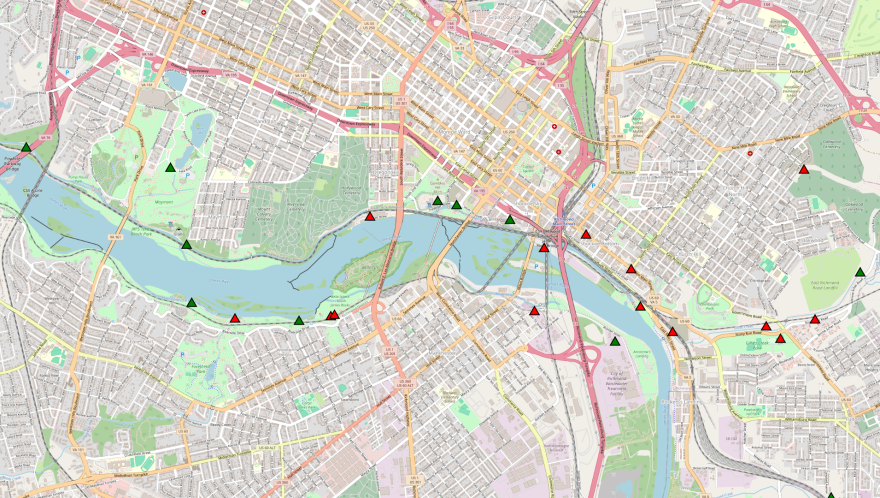Gov. Glenn Youngkin is including $500 million for conservation programs in a caboose budget proposal he's set to detail Wednesday.
Richmond would be the recipient of one of its largest direct allocations: $50 million for projects to rehabilitate its combined sewer system, which dumps sewage into the James River when it’s overburdened.
During the 2023 General Assembly session, it seemed like Richmond could receive double that. As VPM News previously reported, the city needs about $1.3 billion to address its 1870s-era sewer system.
Youngkin and lawmakers went into “skinny” budget meetings planning to set aside $100 million for the city’s sewage woes. But by the time the budget was approved in September — months past deadline — that funding was nowhere to be found.
Mayor Levar Stoney said he is “disappointed” in the recent $50 million proposal.
“Although the 2035 deadline set by state law may seem far off, it’s just around the corner for a project as large and complicated as Richmond’s combined sewer modernization project,” Stoney said in a Tuesday statement.
Grace LeRose, Department of Public Utilities program and operations supervisor, underlined the need for state dollars during an October meeting of Richmond City Council’s Government Operations Committee. She said the city’s remaining state compliance work would cost between $600 million and $800 million.
“What we need from our supporters right now is advocacy for support from the General Assembly,” LeRose said. “The $100 million that was dropped from the state budget really needs to be added in the caboose budget.”
The city’s final plan for tackling the sewer system’s pollution is due to the state Department of Environmental Quality in June 2024, leaving only 11 years to complete the construction work — assuming the proposal is immediately approved.
“Our team needs significant, predictable grant funding from the Commonwealth to meet that deadline,” Stoney said.

Stoney also reiterated concerns for Richmond ratepayers. In the past, he’s estimated that average city water rates would triple if the state didn’t provide grant funding for the sewer upgrade.
Richmond’s sewer combines flows of stormwater and wastewater. The system is not designed to hold the volume of water produced by moderate or heavy rainfalls, so it overflows into the James River and its tributaries at designated points. Every year, about 2 billion gallons of mixed rain and wastewater are dumped during these events.
Youngkin spokesperson Christian Martinez said the governor’s proposal recognizes the “long-term importance” of cleaning up Richmond’s sewer.
“But [it] also balances the surplus limitations with the Governor's desire to ensure funding going to priority projects getting us closer to the Commonwealth's 2025 Bay Goals,” Martinez wrote in an email.
The governor and lawmakers will have to contend with a return to normalcy after years of federal COVID-relief funding ends. Youngkin also said he’s planning for a minor recession that will hamper revenues.
The environmental allocations will compete with a range of high-profile priorities — like education and tax relief. Lawmakers will head to the Virginia Capitol on Jan. 10 to debate those allocations.
Youngkin’s budget proposal will also set aside:
- $200 million for Agricultural Best Management Practices implementation to reduce pollution from farmland;
- $73.85 million for the Norfolk Coastal Storm Risk Management Project;
- $100 million for the Community Flood Preparedness Fund for large resilience and recovery projects, previously funded with Regional Greenhouse Gas Initiative proceeds;
- $25 million for Resilient Virginia Revolving Loan Fund for local governments and property owners;
- $8.2 million in critical operations and staffing funds for conservation and state parks;
- $6.1 million for dam safety infrastructure improvements;
- $5 million for the Virginia Battlefield Preservation Fund;
- $3 million for the Virginia Oyster Replenishment Program;
- $2 million for freshwater mussel propagation and restoration;
- $35 million for Bristol landfill remediation projects.



